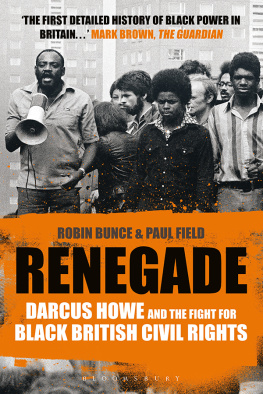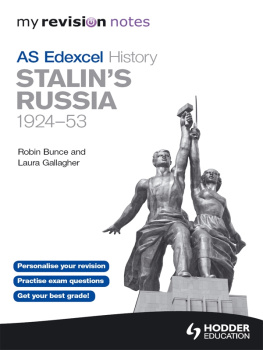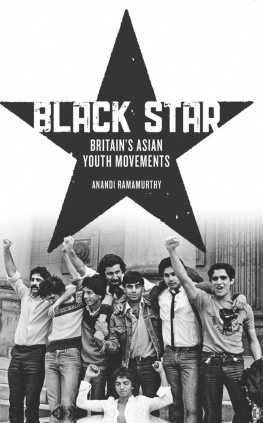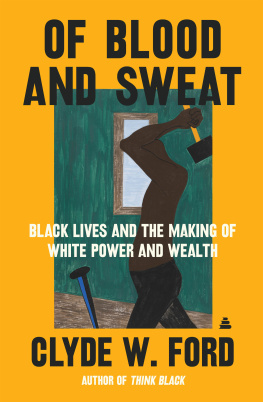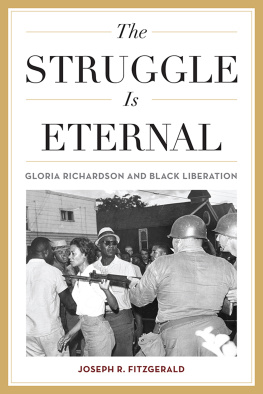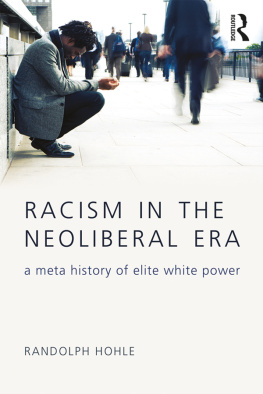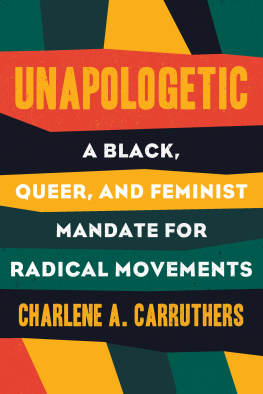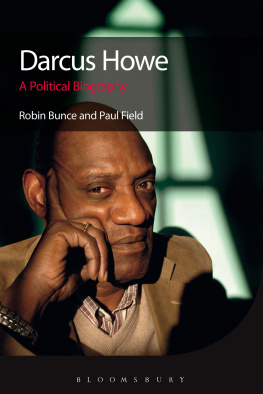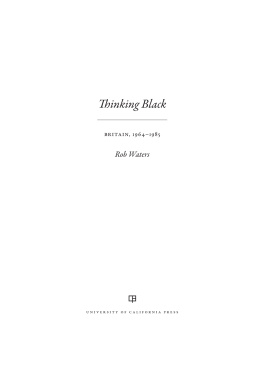RENEGADE
In memory of C. L. R. James
Praise for Renegade: The Life and Times of Darcus Howe
This biography of Darcus Howe is undoubtedly a labour of love. Robin Bunce and Paul Field have made a creditable attempt to chart postwar black activism through one mans life. And there can be no other person more appropriate to build the story around because Darcus Howe is one of the standout activists and public intellectuals of his generation.
Diane Abbott MP, The New Statesman
An obvious candidate [for the Orwell Prize] from this years nominees is Robin Bunce and Paul Fields political biography of the activist and journalist Darcus Howe. The book is political in far more than its content: as the authors rightly say, Britains Black Power movement is in danger of being written out of history.
Conrad Landin, The Independent
This is a long overdue and badly needed biographical portrait of the black Trinidadian political radical and broadcaster Darcus Howe The pioneering efforts of Bunce and Field, undertaken in close collaboration with Howe himself and his partner, Leila Hassan, mean that for the first time the essential facts of Howes life and work are presented in one volume, complete with some remarkable photographs.
Christian Hgsbjerg, University of York, Twentieth Century British History
Darcus Howe has been a towering figure, a powerful voice and an indomitable spirit for nearly half a century. His life embraces the history and critical importance of the struggle for justice and equality before the law. The lessons so graphically described in this book should not be forgotten by anyone lest we be condemned to relive them.
Michael Mansfield, Professor of Law at City University and Visiting Professor of Law at Birkbeck London, UK
This fascinating political biography of Darcus Howe will teach even the most knowledgeable of students of Caribbean history and the struggles of the diaspora many valuable lessons Howe persists as a troublemaker and this book is a fitting and honest testimony to his continuing contribution to the struggle for black liberation and radical change.
Gary McFarlane, International Socialism

CONTENTS
Darcus Howe was a name which passed me by when I was a teenager a name mentioned when uncles and aunts visited, over Saturday night drinks or Sunday lunch. Like many Caribbean households, these black histories of struggle, both in Britain and in our islands back home were common conversations which youngers like myself only came to appreciate retrospectively. I only began to appreciate Darcus as a politics undergraduate with no courses on racism, anti-racism or black politics or thought, Darcuss column in the New Statesman jumped out at me, from an otherwise all too often white political magazine. Like my family, he was obsessed with the 1970s and early 80s, and his reference points were Brixton and Trinidad, uprisings and rebellions. His cutting indictment of the government, the police and the mainstream press was both brutal and incisive he was furious, and I was captivated.
Over a decade later, and Black Britain is as angry about racism as it has ever been. As I write, it is impossible to ignore that the summer of 2020 has seen the largest anti-racist protests in British history. Hundreds of thou-sands demonstrated in over 260 towns and cities across the country, initiated by solidarity with protests against racist police violence in the US, but defined by a clear message: the UK is not innocent. This new generation of activists have lived through Obamas empty promise for change, and a Brexit Britain that promises nothing but national-ism and imperial nostalgia. Climate breakdown, economic crisis and a bloated police, prison and border system are dangerously normal. In a political arena in which Parliament and Presidency are dead ends, where do we turn for the radical change which feels more urgent than ever? The renegades of the 1960s and 70s, as the world was decolonising and the future of capitalism and imperialism seemed uncertain, offer vital insights and lessons. Darcus Howe, through his organising and protest, rhetoric and writing, film and thought is an indispensable piece of Britains Black power puzzle.
In the aftermath of the rebellions of the 1980s, Darcus decried the government response in the pages of Race Today, lamenting the community policing [initiatives], liaison committees, an independent complaints system and other such trivialities. Today, the trifling extends further Nike and Amazon declare that Black Lives Matter, while racial capitalism defines these very entities via the exploitation of their workers from factory through to shop floor. Politicians of all persuasions and even the police themselves pay lip service to Black Lives Matter, while feeding a prison system which has nearly doubled in 30 years, and incarcerates Black people at the same rate as in the US. Corporations, government departments and NGOs desperately scramble for diversity drives, equality workshops and unconscious bias training. But these are simply liberal (often laughable) attempts to be seen addressing racial prejudice, while the exploitation, control and violence of racism itself continues unabashed. They are a wilful attempt to strip Black politics of its radicalism and of its confrontation with capitalism and imperialism; the engines of racial oppression.
The movements of resistance detailed in this book dont simply recall a vital history. From the Black Panther Movement and the Mangrove to Race Today and the Black Peoples Day of Action, these histories are a corrective to the attempts by policy makers and profit seekers, to co-opt the twenty-first centurys Black political movement. Darcuss life is a story of Black Power struggles: from colony to mother country, from the streets to the courts, from grassroots organising to broadcast media. These movements did not permit powerful institutions to take Black liberation and turn it into something palatable, commercial, individualising and ineffective. Activists like Darcus exploited the weaknesses and identified opportunities in these institutions to push forward the message of Black liberation. This could only be done by maintaining strong links with radical grassroots struggles against racism, capitalism and imperialism locally, nationally and across the world. The people are the priority, and I hope this book inspires every reader to not only look more deeply into the politics and history of Black Power, but to use these political histories to shape a future in which radical Black thought and action is as urgent as ever.
January 2021
Adam Elliott-Cooper is a writer and researcher based in the Department of Sociology, University of Greenwich. He works with The Monitoring Group which campaigns against racist state violence. He is author of Black Resistance to British Policing (Manchester University Press).
This new edition of Renegade comes at the end of several years of political tumult. The book was originally conceived after Barack Obamas first inauguration, at a time when many pundits in Britain and the US were proclaiming a new era of post-racial politics. The last few years have been proof, if proof was needed, that race is still a defining issue in the politics of the anglophone West. In 2016, Nigel Farages Brexit campaign and Donald Trumps presidential campaign both played on racial prejudice and Islamophobia. In the wake of the Brexit vote, hate crime rose in Britain. Similarly, Trumps presidency emboldened the so-called alt-right and violent grass-roots white nationalist activity. More recently, the 2020 presidential election campaign has witnessed armed white vigilantes taking to the streets to defend property, as Black activists and their allies protest the shooting of Jacob Blake by white police, and the killing of George Floyd by white police. Blake and Floyd are the latest victims of ongoing police violence against Black people in the US.
Next page
